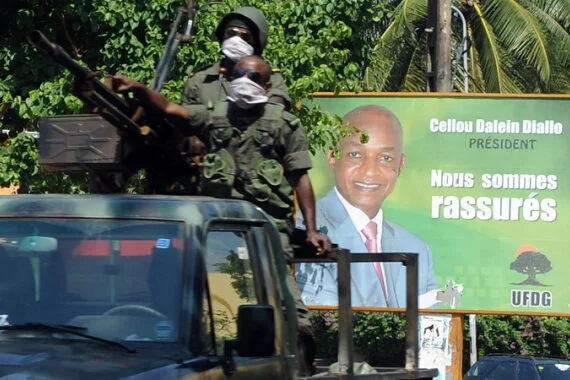Evidence of democratic backsliding is commonplace in our world these days, including across Africa, as the recently rigged elections in Tanzania and Uganda demonstrate. One country, however, that has not received nearly enough attention is my home: Guinea.
Guinea is indeed one of the starker examples of a rapid decline in terms of respect for democracy and human rights. In October 2020, our people voted in elections that were marred by massive amounts of violence perpetrated by security forces aligned with the ruling party, as well as documented reports of fraud and rigging on election day itself. This was perhaps the inevitable result of our president, Alpha Conde, forcing through constitutional changes several months prior, which allowed him to seek a third term in office.
The most tragic part of this story is that before he was president, Conde was a pro-democracy campaigner and a prominent political prisoner. Now, fast forward a decade, and it appears that Conde has secured a life presidency. As the American journalist Robert Caro once said: “power does not corrupt, it reveals.”
In order to achieve his desired third term in office, from October 2019 to October 2020, before the election, over 150 Guineans were killed by our security forces with impunity. Later, in the aftermath of October 2020 election, Conde unleashed a campaign of intimidation and violence against the real winner, Cellou Dalein Diallo, and his supporters. This nationwide clampdown resulted in 350 opposition supporters being arbitrarily arrested and the confiscation of their private property; four of those unjustly detained also died while behind bars. Mr. Diallo himself surrounded by the military and placed under house arrest for 10 days – a trend that has become routine across Africa when opposition leaders seek to challenge the legitimacy of election results. Our party headquarters were also occupied by the police and it remains under strict surveillance to this day. Overall, the post-election chaos resulted in 49 people dead and 240 more injured, often as a result of bullets fired from those sworn to protect us. Three months later, none of the perpetrators have been held accountable.
We have literal piles of evidence, compiled by a network of professional poll watchers, that shows Mr. Diallo won the presidential election with 53.84% of the votes. Despite the harassment, intimidation and violence, our party agents obtained results from 15,000 polling stations, amounting to about 84% of polling stations across the country. According to our internal data, President Conde received only 39.4% of the vote. In other words: we have an imposter as president.
Nevertheless, while Guinea’s 2020 election was verifiably stolen, it does not mean the battle for democracy is over. When one takes a closer look, the battle is actually just beginning. Importantly, those of us involved in the pro-democracy movement need to see this current predicament as an opportunity to create alternative and creative ways to fight the battle.
One pathway is to create and pursue networking opportunities that provide avenues for democratic solidarity across Africa. Despots and authoritarians, like Conde, work together and learn from each other. We democrats must do the same, but in greater numbers and with greater cohesion than has been demonstrated thus far. Likewise, we must continue to organize our citizenry in light of their demands for democracy and in defiance of the violence they often face for demanding those rights. There is an African proverb that says, “we can hear the tree falling, but we do not hear the forest growing.” We are growing, and we must grow together.
For Guinea, like any other country in the 21st century, no democracy means no stability. And no stability means no economic development. Guinea’s collective struggle for democracy will continue until our demands are met. And we believe it is possible to turn the tide of events and transform the existing state of affairs. In fact, we have no other choice.
Nadia Nahman is an expert in human rights law and currently serves as the chief of staff and official spokeswoman for Guinea’s main opposition leader, Cellou Diallo.
DISCLAIMER: The views expressed in this publication do not necessarily reflect the views of Vanguard Africa or the Vanguard Africa Foundation.

